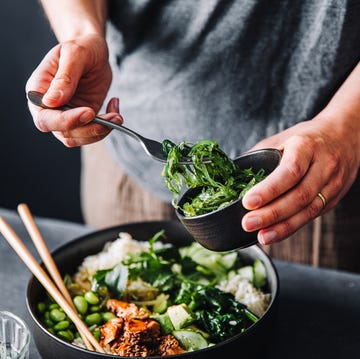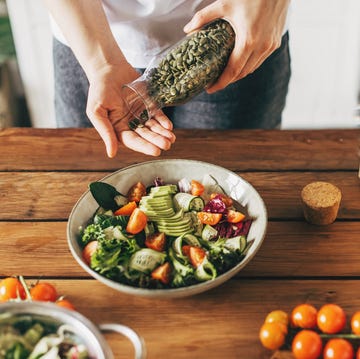11 Plant-Based Foods That Are High in Magnesium
Add these foods to your diet to ensure your body is getting enough of this essential nutrient.

You know how important it is to get the recommended daily amount of nutritional superstars like fiber and calcium. But don't forget about nutrients like magnesium that may not be top of mind.
“Magnesium is an essential mineral that plays a role in over 300 enzymatic reactions in the body,” says Sandra Vasquez, MS, RD, CSOWM, bariatric dietitian at Cooper University Health Care. “It’s critical for functions like muscle and nerve regulation, blood pressure control, blood sugar management and protein synthesis. It also helps convert food into energy and supports the production of DNA and RNA.”
Unfortunately, many of us fall short of the recommended amount. “In dietary surveys, it was found that around 48% of Americans of all ages did not get enough magnesium from food and beverages to meet their estimated average requirement,” says Jason Ewoldt, MS, RDN, at Mayo Clinic.
Magnesium requirements increase slightly as you age (vary if you're pregnant or lactating).
- Age 19-30: 310mg/day for women; 400mg/day for men
- Age 31-50: 320mg/day for women; 420mg/day for men
- Age 51+: 320mg/day for women; 420mg/day for men
Some groups, such as people with GI disorders, people with type 2 diabetes and older adults, are more prone to magnesium inadequacy. “This is where intakes of magnesium are below the recommended intake but above the amount needed to prevent deficiency,” says Ewoldt.
Severe magnesium deficiency is rare, but signs include loss of appetite, nausea, vomiting, fatigue, tingling, cramps, seizures and even personality changes, says Ewoldt. Chronically low intakes of magnesium may contribute to an increased risk of illness over time, including cardiovascular disease, type 2 diabetes, osteoporosis and migraine headaches, Ewoldt adds.
If you're hoping to increase your own magnesium intake, consider adding the magnesium-rich foods below to your diet.
Laura Iu, R.D., is a registered dietitian nutritionist, certified intuitive eating counselor, yoga guide, and owner of Laura Iu Nutrition, a private practice in New York City. She earned her Bachelor of Science in Nutrition and Dietetics from New York University and completed her internship in dietetics at Weill Cornell & Columbia Medical Center of New York-Presbyterian Hospital. She went on to work in New York City’s top hospitals, including Mount Sinai Hospital and NYU Langone Health. She believes that true health is all encompassing — physical, emotional, and mental wellbeing — not an external measure via shape or size.

Readers Also Read

Is Rotisserie Chicken Healthy?

9 Fruits That Are High In Magnesium

But Wait, Are Sardines Actually Healthy?

The Magnesium-Rich Foods Your Diet Needs ASAP


















